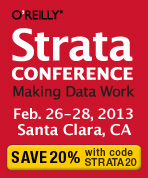Here are a few stories from the data space that caught my attention this week.
Two Hadoop BI startups secure funding
 There were a couple notable pieces of investment news this week. Platfora, a startup looking to democratize Hadoop as a business intelligence (BI) tool for everyday business users, announced this week that it has raised $20 million in series B funding, bringing its total funding to $25.7 million, according to a report by Derrick Harris at GigaOm.
There were a couple notable pieces of investment news this week. Platfora, a startup looking to democratize Hadoop as a business intelligence (BI) tool for everyday business users, announced this week that it has raised $20 million in series B funding, bringing its total funding to $25.7 million, according to a report by Derrick Harris at GigaOm.
Harris notes that investors seem to get the technology — CEO Ben Werther told Harris that in this funding round, discussions moved to signed term sheets in just three weeks. Harris writes that the smooth investment experience “probably has something to do with the consensus the company has seen among venture capitalists, who project Hadoop will take about 20 percent of a $30 billion legacy BI market and are looking for the startups with the vision to win that business.”
Platfora faces plenty of well-funded legacy BI competitors, but Werther told Christina Farr at Venture Beat that Platfora’s edge is speed: “People can visualize and ask questions about data within hours. There is no six-month cycle time to make Hadoop amazing.”
In other investment news, Continuuity announced it has secured $10 million in series A funding to further develop AppFabric, its cloud-based platform-as-a-service tool designed to host Hadoop-based BI applications. Alex Wilhelm reports at The Next Web that Continuuity is looking to make AppFabric “the de facto location where developers can move their big data tools from idea to product, without worrying about building their own backend, or fretting about element integration.”
 Strata Conference Santa Clara — Strata Conference Santa Clara, being held Feb. 26-28, 2013 in California, gives you the skills, tools, and technologies you need to make data work today.
Strata Conference Santa Clara — Strata Conference Santa Clara, being held Feb. 26-28, 2013 in California, gives you the skills, tools, and technologies you need to make data work today.
The Internet of Things starts to scale
A start up in France is making moves to bring the Internet of Things from concept to reality at scale. Tom Simonite at MIT Technology Review reports that the startup, SigFox, is building cellular networks across France specifically designed to connect things, rather than people, to the Internet. SigFox’s chief of business development Thomas Nicholls explained to Simonite that sensors require a different type of network technology than what’s used to connect humans to the Internet. Simonite reports:
“SigFox builds its networks in the same way as a cellular provider, using a system of connected antennas that each cover a particular area and link back to the operator’s central network. But the antennas use a different radio technology, developed by SigFox, known as ultra narrow band. This technology would not be of much use for streaming video to an iPhone, but it allows devices connecting to the network to consume very little energy, says Nicholls, and it allows for very long-range connections.”
Simonite reports that Nicholls says SigFox is close to rolling out the network for France with just 1,000 antennas and that expansion into other European countries is underway. Nicholls also said they’re in talks with U.S. cellular carriers to bring the technology to the U.S.
In related news, U.S. startup EcoFactor teamed up with Nevada Energy to install smart thermostats in Las Vegas homes. The data gathered by EcoFactor’s software will not only help make the power grid more efficient and reliable during peak usage times, but it will allow for minor adjustments throughout the year for further cost and load savings. Martin LaMonica reports at MIT Technology Review that EcoFactor estimates it can lower loads by an average of 13%. LaMonica describes how the system works:
“The company’s software continually gathers data from the thermostat, such [as] building temperature, local weather and when consumers adjust settings. Based on an analysis of the data, it sends out instructions to the thermostat to improve efficiency. The thermostat communicates with the home WiFi network and EcoFactor connects to the thermostat over a home broadband connection.”
According to LaMonica’s report, Nevada Energy plans to install 10,000 smart thermostats and expects to reduce loads by 25 megawatts during peak summer usage.
A call for a national digital and data literacy campaign
Josh Stearns, journalism and public media campaign director for Free Press, took a look this week at the big data landscape and argued that privacy and awareness issues have escalated to such a point that intervention is called for. Stearns writes:
“For the most part, people have no idea the extent to which they are being followed and watched, analyzed and targeted, bought and sold. Now, more than ever, we need a national digital and data literacy effort on the scale of the anti-Big Tobacco campaign to address the escalating privacy and security issues facing citizens and their data.”
Stearns points to an article by Alistair Croll in which Croll outlines ways our data can be used against us and argues that big data is a civil rights issue “society in general is ill-equipped to deal with.”
Government legislation, Stearns says, will be necessary and will come, but he argues that technology is changing too quickly for us to adapt and that what we need in the meantime is a massive-scale campaign that will “fundamentally shift people’s understanding and relationship with their personal data.”
Stearns offers up suggestions on how to make this happen — you can find his piece here. It’s this week’s recommended read.
Tip us off
News tips and suggestions are always welcome, so please send them along.
Related:
